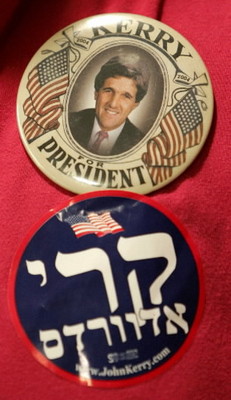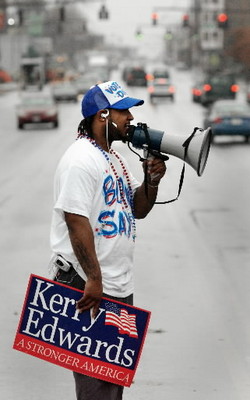 The election was everywhere in Ohio. I visited my first home in America—in the very frum section of Cleveland Heights. It looked exactly the same as it had in 1985 when we arrived in America—only now it had a Bush-Cheney poster staked in the front yard, as did many houses in this neighborhood. Many of these Jews saw in Bush’s religiosity a reflection of their own, they admired his defiance to vulgar materialistic America, his militant stance against Arab terror, his support for Ariel Sharon. I hadn’t expected the election to intrude on my trip back home in such a stark way; but there it was, in the form of a red, white and blue sign posted in the exact spot where I once set down a makeshift home plate in the first of my life’s many improvised baseball fields. Once again, it seemed, politics had claimed a private spot in my consciousness.
The election was everywhere in Ohio. I visited my first home in America—in the very frum section of Cleveland Heights. It looked exactly the same as it had in 1985 when we arrived in America—only now it had a Bush-Cheney poster staked in the front yard, as did many houses in this neighborhood. Many of these Jews saw in Bush’s religiosity a reflection of their own, they admired his defiance to vulgar materialistic America, his militant stance against Arab terror, his support for Ariel Sharon. I hadn’t expected the election to intrude on my trip back home in such a stark way; but there it was, in the form of a red, white and blue sign posted in the exact spot where I once set down a makeshift home plate in the first of my life’s many improvised baseball fields. Once again, it seemed, politics had claimed a private spot in my consciousness.
II
Leon Harris was my best friend growing up in the neighborhood. His family hailed from Alabama and, like many black people now living in Cleveland, had migrated north in search of jobs in industry. He claimed that two-sport hero Bo Jackson was his cousin and I was inclined to believe him. Leon and I got in all types of trouble. Using our slingshots and an ample supply of hoarded acorns we once crouched on my roof and opened fire on a group of Christmas carolers who had made the mistake of gathering in front of my house to sing of their Lord’s wondrous birth. We didn’t fire directly at them – we aimed close enough so that they knew they were being fired upon but far enough to avoid injuries. For Leon, this was pure mischief (so I thought—I never really examined his motivation); but for me, it was something more: as an eleven year-old Jewish kid dumped into Cleveland and feeling misplaced in America, this encroachment of Christianity onto my family’s front yard was simply unacceptable. Mischief was only an added bonus.
Leon and I had been through a good deal together as kids, but I hadn’t seen him for over ten years. So it was with some trepidation that I stood at his mother’s front door on the day before the election and waited to see if someone would answer the doorbell. Would it be his mother? Would it be him? Or a complete stranger? I had a message for whoever answered the door—America Needs Your Vote! But obviously, that wasn’t all that brought me there.
The person who answered the door was a short black woman whose hair was pulled back improbably tight and who had an alarmingly firm handshake. Wearing a suit and heavily made up, she appeared to be on her way to work. She had never heard of Leon Harris. Oh yes, she was voting, she said. Not about to sit this one out. But her son, who had just turned 18, refused to vote. She was going to make sure he voted, she assured me, but asked if I would talk to him anyway.
In the back yard—a yard that I knew very well—I found a trim young man wearing an LA Lakers sweatshirt and jeans at least five sizes too large. Even though I knew that this was the style, I couldn’t help but imagine that this kid was shrinking before my eyes and that soon he’d simply vanish, leaving behind a pile of gigantic clothes. He took note of my presence but didn’t shift his gaze from his primary focus: winding up fuses and setting up an impressive array of explosive sticks. Fireworks. His hands were well-practiced, moving quickly and efficiently.
“What you got there?” I asked.
“Rockets,” he said without looking up.
“Just for the hell of it?” I asked. I suddenly noticed that the trees here were already bare and that the piles of leaves surrounding this boy were beginning to decay with a familiar, sweet aroma. I suddenly realized that I associate this smell with Cleveland.
 A helicopter leaped into the sky.
A helicopter leaped into the sky.
“P-Diddy’s up there,” he said, indicating the chopper. P-Diddy, the rapper-turned-hip hop mogul-turned-voting-advocate had indeed been in Cleveland with actor Leonardo DiCaprio on his Vote or Die campaign encouraging young people to storm the polls. Whether this was actually his helicopter I couldn’t say.
“I’m gonna take his ass down,” the boy said without emotion and suddenly jumped into action lighting the fuse. One rocket after the other wizzed heavenward surface-to-air style and, as if slamming into some invisible barrier, exploded in a series of ferocious pops. Not one landed remotely near its target, of course, and the helicopter escaped unharmed. Another of history’s hidden assassination attempts.
The young man was looking at me now. He wasn’t smiling nor had he at any point while firing off the rockets. Perhaps fireworks had once delighted him, but not any more.
“Why do you want to kill P-Diddy?” I asked.
He shrugged and looked down at the ground. He probably knew that he was getting a little too old for this kind of thing. His mother had mentioned that his older brother was stationed in Iraq—he might have felt a bit frivolous in comparison. Finally he said: “Because he came here and didn’t bust his shit, man. He just left. If he don’t do his thing, I’m gonna make him feel it.”



Let them Eat Myth
Douglas Rushkoff
Hipster Antisemitism
Jennifer Blowdryer and Alvin Orloff
To Ohio and Back
Avi Steinberg
The Knowing
Jay Michaelson
Abba Kovner: The Warrior in Old Age
James Russell
Men who Laughed
Ari Belenkiy
Archive
Our 610 Back Pages
Zeek in Print
Fall/Winter 2004 issue now on sale
About Zeek
Mailing List
Contact Us
Subscribe
Tech Support
Links
From previous issues:
How I Finally Learned to Accept Christ in my Heart
Jay Michaelson
Surrender
Niles Goldstein
The Gifts of the German Jews
Michael Shurkin